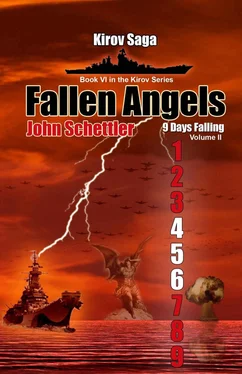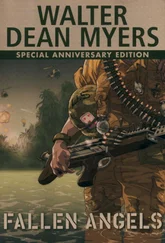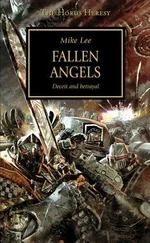There was something not right about this, thought Higman. It just isn’t right. Those aren’t planes we’re fighting out there. They aren’t men. We’re up against some kind of slick new rocket system, and it’s eating us alive. Who knows how many we lost today? Whatever the Russians had up there on the horizon, it was a real game changer. We’re going to have to hit them with every goddamned thing we have to get through a defense like that… Everything we have.
Backon Ticonderoga that was the new consensus too, though Ziggy Sprague wasn’t happy about it one bit. He wanted to press on up north and settle the score, but word came in from Halsey on the Missouri —pull the boys out.
Apparently some starchy British Admiral had chewed on his ear and convinced him the Russians might have more up north than we bargained for, he thought. Well how in God’s name would they ever know that unless we get up there after them? The fleet had nothing on surface radar returns, but the two radar pickets were still in tight on this Russian task force, though they reported it was difficult to track them. The ships came and went on the radar screens.
He could not know that the architecture on the two newer ships, Orlan and Admiral Golovko , incorporated reduced radar cross section features, odd angles and special reflective tiling and paint that made the ships very slippery when even modern radars tried to finger them. Sprague’s two radar pickets would get a contact on Kirov , see other ships nearby, and then they would vanish again.
Yet orders were orders. Halsey wanted to coordinate with the British and was also moving up his own task force. The Russians were playing hardball, and it looked like the Bull wanted to double up on them to make sure they got the message. That was the only way Sprague could figure it…until the missiles came in.
They had nothing on radar. Then one man thought he saw something. The P-900s were just too fast to track on their terminal run at Mach 2.5, over 3000 kph. The US antenna swept the horizon once every ten seconds. If an operator managed to get a lucky return blip on the missile, by the time the system swept around for another look the Sizzlers would have traveled eight and a half kilometers. Instead of a steady inward approach like the aircraft they were used to tracking, the blip would seem to hop across the screen sweep after sweep, covering over 50 kilometers range in a single minute! By the time the radar operator interpreted this as a threat instead of a glitch, it was too late. Even as he turned his head to report the anomaly, something came at the fleet, low and fast, and it found the Wasp about a thousand yards off the starboard side of Ticonderoga .
The ship just blew up in an angry orange fireball forward of the island, and all Sprague could think of when he saw it was that some rogue Japanese submarine had slipped inside his destroyer screen and put a torpedo into the carrier. A minute later the second Sunburn came in, and this time Sprague had his field glasses up and saw something blur in on Bataan . That ship was hit amidships, and a huge column of smoke billowed up to mark the kill. He looked up, thinking he might see Kamikazes diving on the task group, but he could only see his fighter reserve on combat air patrol over the carriers. What was going on here?
Wasp was hit again. He literally saw a Hellcat blown apart on the forward flight deck and a segment of the wing spin up through a red-black fist of fire and smoke.
“Signal Wasp!” He shouted. “How bad is it over there?”
The fourth Sizzler executed a late stage popup maneuver and struck the island flush, and the explosion was terrific. Wasp seemed to list from the shock alone, then slowly righted herself and continued wobbling forward through smoke and fire.
When the first missile hit, it struck right beneath the forward 5 inch gun battery and smashed on through the armor plating. The missile delivered a 400 kilogram warhead, and the additional kinetic impact was severe. Thankfully most of the missile’s fuel had been expended, but the shock and fire were immediate.
Seaman Ernest Bird had been on a ladder right near the impact site just a minute before the missile hit home. In that time he had casually climbed up to the flight deck, and strolled over to chat with Gunner’s Mate Ralph Cella. They called Ernie the “Lucky Bird” because fate had spared him a gruesome end earlier that year when his relief had been late, keeping him at his post instead of seeing him off to the mess hall that day. A thousand pound bomb came flaming in through the deck that morning, and uninvited guest for breakfast. Ernie’s luck was still good, but he was still close enough to the forward battery to be knocked on his ass by the concussion and shock when the missile hit.
The battery was soon embroiled in a raging fire, with hot jets of flame piercing through holes in the deck around the gun mount. Seaman Bird struggled to his feet and ran to do his job—fire control. He was going to be a very busy man that day.
When the second missile hit Chuck Malkasian had made it down to his post in the engine room. He was water tender on the boilers that morning, but soon had more water on his hands than he would ever need. A four inch thick steel bulkhead blew apart and the ocean came raging in.
“Close all water tight doors!” It was Chief Warrant Officer Woody Morrow. The ‘Wood Man’ was standing tall at his post, his deep voice clear even over the roaring rush of seawater. Crewmen rushed to the doors, struggling to get them shut against the force of the inrushing water from the adjacent compartment, their knuckles white on the iron securing wheels.
“Hey Wood Man!” Malkasian yelled back. “How the hell we gonna’ get out of here if we shut this last hatch?”
“Can it, Malkasian. Take the ladder up behind the boilers.”
“Well it’s hot as hell back there, Chief!”
Malkasian didn’t have to explain any further. The boiler exploded and he was knocked to the deck. He saw boiler man Red Riley thrown against a bulkhead by the explosion and killed instantly, his broken body lifeless on the deck as the water surged in. Chief Morrow was dazed but the rest of the crew in the compartment were all alive. Malkasian struggled up on his knees grabbed the Chief by his collar and began dragging him towards the safety of the still open hatch.
“Come on! Come On, Everybody out! There’s nothing we can do here. Get through and seal this last hatch!”
They made it through, tired, wet and shaking with shock and adrenaline. Malkasian was leaning forward, hands on his knees, amazed by what he had seen.
“I ain’t no water tender down here no more,” he said, breathing hard, then looked over his shoulder as a seaman came down a ladder.
“Up on deck!” the man shouted. It was Gunner’s Mate 3rd Class Alfred J. Lewis. “Hey Malkasian, grab a fire hose.”
“What are you doing here, Lewis. They hit the forward flight deck too. Your plank is out there.”
“The forward flight deck?” Lewis put his hands on his hips, the light of anger in his eyes now. My goddamned plank is on that deck!” Lewis was off at a run for the nearest ladder up. He was supposed to be on his gun at 09:00 hours, but his gun was blown to hell now. Nobody was going to burn up his plank while he was still alive on this ship. Nobody!
He was up on deck and stunned by what he saw. The main island was hit square in the middle, and ragged metal shards gaped from the wound while damage control teams sent arcs of water into the fiery breach. Forward of that, the 5 inch battery was completely enveloped in fire and smoke, and he knew no one in there was getting out alive. The flight deck was tilted at least ten degrees off the horizontal, and the ship was listing. The main elevator was blocked by damage and fire, and out on the forward flight deck he saw what he had came to prevent, a fire raging, and very near the place where he imagined his cherished plank resided!
Читать дальше











